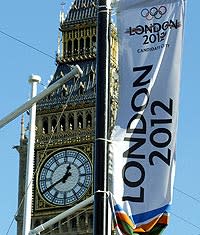London has history on its side
It took less than a day into London's new life as an upcoming Olympic host city for the euphoria to be swept away amid a wave of terror and tragedy.
When the United Kingdom's capital was awarded the 2012 Summer Games after a tense vote at a Singapore convention center on July 6, 2005, impromptu parties and wild scenes of celebration sparked up on the streets of London.
Yet, as the city headed to work with a smile on its face the following morning, the cheer was drowned out as a series of terrorist attacks claimed 52 lives and injured more than 700 people.
British-born Islamic fundamentalists staged four separate suicide bombings, blowing up three underground trains and a public bus. Suddenly, all thoughts of the Olympics were put on the back burner. London had bigger problems to worry about.
Six years on and a sense of calm long ago returned to London, which will become the first city to host three Summer Olympics when it invites the world into its backyard in July and August of next year.
London has experienced some tough times, hurt like everywhere by a tortured global economy and an uncertain job market for locals. But there is a growing sense that it is ready, a year ahead of time, to show itself off to the world, much like it did during the Royal Wedding a few months back.
In terms of preparation, things have gone surprisingly smoothly. Bureaucratic holdups have been negotiated successfully, stadiums got built on or even ahead of schedule, and there has been little of the late panic that regularly plagues Olympic organizers.
[Related: Ryan Lochte, not Michael Phelps, poised to rule pool in London]
Now the challenge is to make it stack up. Every Olympic hosting is effectively an international arm-wrestling match, and London has an incredibly tough act to follow, coming as it does four years after the triumph of Beijing.
The Chinese capital had it comparatively easy in 2008, with a weak act to follow (Athens in 2004 was widely considered one of the worst recent Games) and the might of one of the world's biggest economies behind it.
China threw a boatload of money at its Olympics and created a monster, a magnificent one. The Bird's Nest track stadium and the Water Cube (swimming) became two of the most iconic venues in Olympic history, and the show was a nonstop orgy of entertainment for nearly three weeks.
London can't compete with that financial extravaganza but is approaching the Games in its own way, by setting the event with the backdrop of its own history as a world center.
So much of modern Olympic decision-making is about legacy and regeneration. Improving a downtrodden part of a city is something every bid seeks to do.
London has that, with the signature stadium and most of the events taking place in Stratford, in the traditionally underdog east part of the city. But this Games is just as much about what already has existed for hundreds of years.
The venues make no apology for borrowing from the past. Archery, for example, will take place at Lord's cricket ground – a 200-year-old site that is home to perhaps the most English of all sports and will lend itself to those with bow and arrow during the Games.
Beach volleyball will take place in the shadow of Buckingham Palace. Soccer matches will be held at Wembley Stadium. The tennis tournament is at Wimbledon. Those facts alone make it crystal clear that this is a very different kind of Olympic experience.
It is one which will not be universally popular among its own citizens, though. London is a savvy city, with liberal doses of cynicism and skepticism. In these times when charity begins at home, the blight on the London taxpayer is not one that can be happily smiled away.
The Londoners will come out to party in numbers, like they did for the Royal Wedding in April. Ticket sales have been brisk, despite some overpricing criticisms and a complicated application system, and visitor numbers from overseas are expected to boom.
Global economics notwithstanding, London is both a popular and easily accessible destination, and no shortage of travelers will part with their newly exchanged pounds in return for a dose of Olympic fun.
With its tradition and imagery and special flavor, London will be its own kind of Olympics and be special for it. For a city that never stops, the challenge of hosting the greatest show in sports is not one that needs to be feared.
Other popular stories on Yahoo! Sports:
• Who will light the Olympic cauldron?
• Best Olympic athletes per continent
• Dara Torres seeks to qualify for her sixth Olympics


